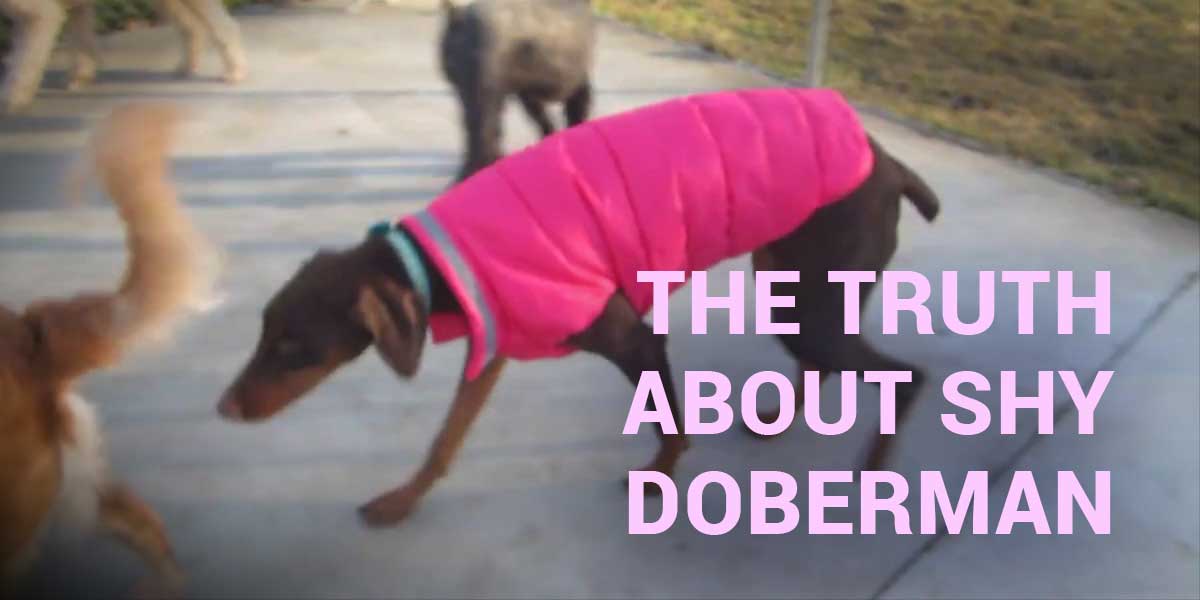One persistent myth about dog behavior and temperament is the incorrect notion that all dogs are born as blank slates, ready to be molded. This is an assumption that any poor behavior must have a historical cause, such as a traumatic past or training mistake on behalf of the owner. We’ve all heard such stories about shy Dobermanns or Dobermanns that are unstable and show inappropriate aggression:
“My dog bites kids because she’s a rescue, she was traumatized by a rough child.”
“My dog is afraid of everything, because his breeder didn’t socialize him before I brought him home.”
“It’s normal for a Dobermann puppy to be shy, they just need their confidence to be built up.”
And so on. Most of the time, it’s misguided – and to an extent, wishful – thinking. There is no such thing as a permanently traumatized dog and a well-bred Dobermann should not be shy. Dogs are very adaptable and there have been many extreme cases where dogs have been successfully rehabilitated, such as the rescued “bait dog” Pit Bulls of Michael Vick.
If it’s not trauma or a lack of socialization that is causing the poor behavior, what does this mean? And more importantly, can it be trained away?
First of all, there are certain traits which are genetic, such as suspicion, boldness, and sound sensitivity. If your dog has extreme fear and reactivity deeply coded into its DNA, there is not much you can do about that. You will never remove this dog’s natural instincts to treat everything (and everyone) with caution. Likewise, if your dog has possessive aggression, you are never going to be able to train it to willingly share its toys or food.
Ethical breeders put an emphasis on socialization because they want to give the best start to their puppies before sending them to their new homes. It is important that the owners continue training and socializing their puppies (especially within the critical 4-month period) in order to prepare their dog for life in the human world. When it comes to rescue dogs, they might not have been socialized at all, which makes things more challenging. For a rescue dog with no exposure, almost everything will be new to them and so they can be cautious at first. Another problem that comes with rescue dogs is that they never learned boundaries, and so it may be difficult to break bad habits. However, an unsocialized or poorly socialized dog does not equal a child biter, if that is not already written in their genetic code.
In terms of training, behavioral modification such as desensitization to certain triggers is possible, but this does not change the genetic makeup of the dog. This means that if this dog is bred to another one just like it, their offspring will exhibit the same characteristics. So, if you have an aggressive or shy Dobermann, chances are that the parents (or at least one of them) were the same way. Needless to say, those who care about preserving the Dobermann would never breed such a dog with such poor temperament. Bad breeding practices are sadly a problem worldwide, and while breeders cannot guarantee how a puppy will mature, selling a dangerous or irreparably shy dog is inexcusable.
My point about the importance of genetics is well illustrated by the image below, which shows an actual traumatized dog that went on to become a therapy dog:

To become a therapy dog, a dog must be absolutely stable. This dog had the correct genetic makeup to overcome its extremely traumatic background and go on to help the lives of those around it. This is the best-case scenario for a rescue dog with trauma. If you have a rescue Dobermann, with hard work it is possible to get to this point, assuming it has good temperament in its genes. However, if you bought a young Dobermann puppy that appears to be traumatized, you are unlikely to get the same result. In any case, the best thing that you can do for your shy, aggressive, or reactive Dobermann is to identify the triggers of this behavior and reach out to animal behavioral specialists or dog trainers.
There have been dogs that have exceeded their owners’ expectations, such as rescue Dobermanns titling in IGP/IPO (formerly known as Schutzhund), but at the same time there are working-bred Dobermanns that are afraid of their own shadow. It all comes down to the individual dog’s genetic potential – that is what you have to work with. You cannot turn a cowardly, shy Dobermann into a monster guard dog and likewise you cannot train an aggressive and unpredictable child biter to be a therapy dog. It is pertinent to keep in mind that your dog may never live up to your expectations, but that if you have done everything possible and it doesn’t work out – you are not to blame.
The post is by our guest writer:
Natasha Muse (Germany). An FCI Dobermann breeder of American lines, focused on temperament, longevity & genetic diversity.
